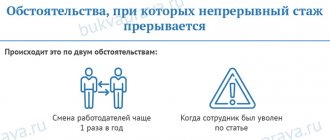Dismissal of a disabled person at his own request can occur according to the rules set out in Chapter 13 of the Labor Code of the Russian Federation. In addition to the general requirements for terminating an employment relationship with a disabled person, it is necessary to take into account the presence or absence of a total disability. In this article, we will analyze how the dismissal of citizens with a confirmed disability group occurs, and whether termination of employment relations is allowed in one day.
Disability groups
Before moving on to the topic of the article, let us briefly dwell on disability groups and give them a brief description.
Table 1. Disability groups
| Group | Description | Work ability |
| First | Complete loss of ability to work and inability to maintain life functions without assistance | Absent |
| Second | To maintain vital functions, additional devices are required, as well as periodic and long-term rehabilitation. No ability to move without assistance | Absent |
| Third | Health conditions do not significantly affect the ability to care for oneself | Present |
At the moment, the third disability group is the only group officially recognized as working. However, disabled people of the second group also sometimes participate in labor activities.
Is a group 3 disabled person required to work 2 weeks upon dismissal?
The rules on two-week work do not apply to dismissal during the probationary period (the notice period for dismissal is three days) and to the dismissal of the head of the organization (one month). You can also not work for two weeks in case of enrollment in an educational institution, retirement, change of place of residence, caring for a disabled person of the 1st group (the employer may require documentary confirmation of all these circumstances).
Dismissal of a disabled person of group 3 can be carried out for several legal reasons. Labor legislation does not give an employer grounds to fire an employee with limited work capabilities simply because he is disabled. In addition, the third group of disability is not a complete loss of ability to work, but only partial.
Grounds for dismissal of a disabled person
In order for a manager to be able to legally fire an employee with a disability, he must have valid reasons for doing so. Moreover, the Labor Code provides for special conditions for disabled people, implying easier working conditions. Accordingly, management must not only be loyal to the efforts of such an employee, but also meet him in a number of issues related to the organization of the work process.
A valid reason for dismissal may be violation of discipline or inability to perform one's duties.
Objective factors that will be considered sufficient grounds for dismissal of a disabled person of the third group include the following:
- An employee with a disability has concluded that his current health condition does not allow him to cope with his duties. However, even in this case, he can either quit or inquire about other vacancies that he can handle. If other positions are not suitable for the employee, management has the right to fire him. Upon dismissal, an employee has the right to refuse two weeks of work;
An employer may dismiss a disabled person if his condition does not allow him to continue working.
- The employee has repeatedly violated the rules of conduct established by the organization. Such violations include periodic absenteeism, failure to fulfill or exceed one’s own authority, etc. In such situations, regardless of whether the employee has a disability, management has the right to dismiss him unilaterally;
- The employee repeatedly violated labor discipline. If a person is at his workplace under the influence of alcohol or drugs, then this is an unambiguous signal to terminate the employment contract;
- mass dismissal of employees as a result of staff reduction or liquidation of the enterprise itself. There are objective reasons that are independent of employees, and sometimes even of managers themselves. Dismissal during the liquidation of a company is a matter of course, but certain difficulties may arise during downsizing;
When a company is liquidated, all employees are dismissed
- the organization moves to another region, while it is not possible for the employee to move;
- For certain reasons, an employee ceases to cope with the range of responsibilities that his position entails. As in the first case, the employer’s task is to offer the employee alternative jobs. In case of refusal to transfer, dismissal will have legal grounds;
- the employment contract was drawn up incorrectly and in violation of the norms stipulated by the Labor Code.
General provisions
Dear readers! The article talks about typical ways to resolve legal issues, but each case is individual. If you want to find out how to solve your particular problem , contact a consultant:
8 (800) 700 95 53
APPLICATIONS AND CALLS ARE ACCEPTED 24/7 and 7 days a week.
It's fast and FREE !
Disability is understood as the development of an illness or several illnesses in an employee, due to which he cannot normally perform his duties to the employer.
Taking into account the severity of a person’s physical or mental limitation, three disability groups have been identified. A complete list of criteria for distinguishing between these groups is contained in Order No. 1024 of the Russian Ministry of Labor dated December 17, 2015.
Based on this document, an employee with a third disability group can, himself or with the help of other people (specialized devices), perform the following actions:
- take care of yourself;
- move;
- understand the environment and navigate it;
- analyze your own behavior and correct it;
- learn new skills, get an education;
- work in conditions that the employer has created specifically for him.
Based on these criteria, it can be summarized that the third disability group is considered working and people belonging to it can work without harm to their health.
The state tries to take care of people with disabilities, therefore it obliges all managers whose organization employs more than 35 employees to provide one workplace to a citizen with restrictions according to the quota prescribed by the government (Article 21 No. 181 of the Federal Law of November 24, 1995).
If a violation of human rights with restrictions is recorded, the employer may receive an administrative penalty (Article 5.42 of the Code of Administrative Offenses of the Russian Federation).
To prove his disability when registering with a new organization, a citizen only needs to present a medical certificate to the potential manager. It must correspond to the form approved in the order of the Ministry of Health and Social Development of the Russian Federation No. 1031n dated November 24, 2010.
This extract can be obtained from a state medical and social examination institution.
How does dismissal happen?
Terminating an employment contract with a disabled employee is somewhat different from a similar procedure carried out with a healthy subordinate. The main difference is that a disabled person (regardless of the assigned group) retains the opportunity not to work for the fourteen days required by law.
Employees with disabilities are exempt from two weeks of work
Dismissal of a disabled person of the third group includes going through several main stages:
- management draws up an official notice of imminent dismissal and sends it to the employee;
- after the employee reads this notice, he is removed from his previously held position (without pay);
- management draws up a dismissal order. This document includes the reason on which the subordinate was dismissed, as well as the clauses of the Labor Code that make this procedure legal;
- the dismissal order is transferred to the employee, who must leave his signature. If a person’s health condition does not allow him to carry out this action, a special mark is entered in the document;
- after the cancellation of the employment contract, the employer makes a settlement with the employee;
- the employer issues the employee a work book with a note left proving the fact that the subordinate was registered at this enterprise.
Employees with disabilities are exempt from two weeks of work
Reference. The employee’s last working day is the day of termination of the employment contract with the management of the organization.
Taxes
The calculation in case of dismissal of a disabled person also has certain nuances. Part 3 of Article 217 of the Tax Code of the Russian Federation states that monetary compensation paid to an employee under Article 178 of the Labor Code of the Russian Federation is not taxable.
When calculating estimated payments, the employer must remember that a disabled person of group 3 who received a “new status” after certain circumstances experienced, for example, the liquidation of the Chernobyl Nuclear Power Plant, is entitled to a tax deduction in the amount of three thousand rubles.
This condition is regulated by Art. 218 Tax Code of the Russian Federation.
Payments
The question of how the employer will pay a dismissed disabled employee should be considered separately. In addition to the standard payments due to each subordinate upon dismissal, employees with disabilities are entitled to additional compensation (with the exception of some cases).
So, upon dismissal, a disabled employee by law must receive the following payments:
- salary for the period of time worked;
- vacation pay (in the event that the employee did not have time to take all or part of the vacation);
- bonuses or allowances that were specified in the collective or labor agreement and in other acts of the organization;
- severance pay, the amount of which is calculated based on average earnings for two weeks.
Payments due to a disabled person include severance pay
It should be noted that in certain circumstances, an employee with a disability may be deprived of severance pay. However, in order to refuse this benefit, management must have a compelling reason in the form of repeated violations of labor discipline and failure to fulfill their direct duties.
When is severance pay issued?
If an organization ends its activities or an employee is laid off, then he has the right to payment of this benefit, in accordance with the law.
Compensation is paid for 2 months based on the average earnings of all employees, regardless of their disability group.
If a disabled person is dismissed by a mutual decision between him and his superiors, then the amount of severance pay is negotiated and set individually. In this case, it is not tied to the average salary.
Dismissal at your own request
If an employee with a disability expresses a desire to leave his position, the dismissal process is much faster and easier. Dismissal at the initiative of a disabled employee consists of the following stages:
- the employee writes a statement containing a request for dismissal. The application must contain the date of the last working day - taking into account two weeks of work or without, if the subordinate refuses it. Refusal will require agreement with the manager;
- the employer issues an order to terminate the employment contract with the subordinate. After both parties sign this document, management settles accounts with the employee and issues all required documents.
Sample application for voluntary resignation
Unfortunately, in practice it happens that management puts pressure on an employee with a disability, literally forcing him to sign the dismissal order of his own free will. In such situations, it is important for the employee to understand that what is happening is a direct violation of his rights and to send a complaint to the labor inspectorate.
The Labor Inspectorate exercises control over employers and monitors all their illegal actions. Based on the complaint received, the employees of this body have the right to conduct an inspection of the organization, which is completely disadvantageous for the management. The results of such an inspection can be either an administrative penalty or lengthy legal proceedings.
You can read about the time frame for considering a complaint to the labor inspectorate and further action scenarios below.
Filing a complaint to the labor inspectorate
Requirements and preferences when there are persons with disabilities on staff
The imposition of restrictions on work ability cannot be a reason for dismissal, except in cases where ITU issues a conclusion stating complete disability.
Typically, this category includes persons with 1st group of disability. If there are 2 or 3 groups, the employer can make working conditions easier or re-equip the workplace so that the employee remains a full-time specialist.
If there are persons with disabilities on staff, the organization has the right to apply for preferences from the state:
- Full or partial tax exemption;
- Reduced rates for paying contributions to the social insurance system;
- Subsidies for the organization of specific jobs.
To receive the full set of benefits, an enterprise must meet the following criteria:
- If it is a public organization, then at least 80% of its roster must be represented by persons with disabilities;
- If this is a commercial enterprise, then the list of requirements is wider:
- The staff employs 50% disabled people;
- 25% of the salary fund goes to pay for their labor;
- A public organization of persons with disabilities has a share in the authorized capital, or property belonging to such an organization is used for statutory purposes.
Benefits for working disabled people
The Labor Code protects the rights of employees with disabilities and provides them with additional benefits that make the work process easier. The adaptation of disabled people is facilitated by the following concessions:
- A disabled employee who, due to health reasons, does not have the opportunity to work full time, has the right to have it reduced. Specific options for changing the schedule are discussed with the manager. By law, a disabled person has the right to switch to a part-time shift or part-time week;
A disabled employee has the right to a reduction in working hours
- the employee has the right to receive extraordinary unpaid leave that was not planned in the vacation schedule;
- When applying for a job, a person with a disability does not have to undergo an executive period. If his candidacy suits the employer, he immediately concludes an employment contract;
- the employer does not have the right to engage an employee with a disability to work at night without the appropriate written consent;
- the employer does not have the right to engage an employee with a disability to work overtime, or to work during holidays or weekends in the absence of written consent;
- an employee with a disability can take two months of unpaid leave at any time during the year;
- The duration of paid leave for disabled people is thirty days (instead of the standard twenty-eight).
Employees with disabilities have longer paid leave
Sometimes it happens that the cause of an employee’s disability is an accident or occupational disease that occurred at the enterprise itself during working hours. In such circumstances, management is obliged to provide the employee with another workplace (or other working conditions) so that he has the opportunity to recover. If controversial issues arise, it is recommended to contact the Fund for the Protection of Disabled Persons, which will help you avoid problems with the law.
Norms of the Labor Code of the Russian Federation
Article 183 of the Labor Code of the Russian Federation states that every citizen during illness is obliged to receive full payment from his director for the entire period of incapacity strictly until full recovery or until he receives the appropriate category of disability (Part 1, Article 6 of Federal Law No. 255).
If an employee is classified as disabled, the director may no longer pay for the period of incapacity. Now this obligation is shifted to the state budget.
It is from this that the disabled person will receive special financial assistance for subsequent therapy.
According to Article 73 of the Labor Code of the Russian Federation, the manager is obliged to monitor the health status of all his subordinates.
If one of the employees is unable to perform his duties for medical reasons, the manager has the right to remove him from his position or transfer him to another place of work where the employee can work without harming his health.
For example, if a subordinate is absent from the workplace for less than four months due to deteriorating health, he can be transferred to another place, but only with his consent.
If an employee refuses to change position or the manager cannot offer him a suitable workplace, the citizen is relieved of all work responsibilities strictly until his full recovery or until a change in circumstances.
If the doctors’ conclusion confirms that the employee needs treatment for more than four months, and there is no appropriate workplace for him, he will be fired on the basis of Part 8 of Article 77 of the Labor Code of the Russian Federation.










